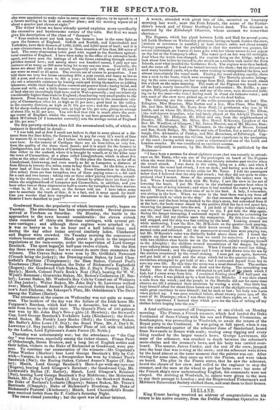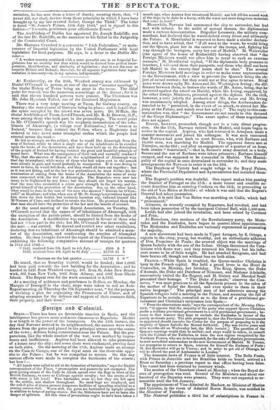IRELAND.
King Ernest having received an address of congratulation on his return to his native country, from the Dublin Protestant Operative As-
sociation, he has sent them a letter of thanks, assuring them, that, " never did, nor shall, deviate from those principles in which I have been brought up by my late revered father, George the Third." The letter is dated "St. James's Palace, 15th July 1843," and is signed in this fashion—" I remain, gentlemen your affectionate Ernest."
The Archbishop of Dublin has appointed Dr. Joseph Radcliffe, son of the late Dr. Radcliffe, as the successor to his father in the Judgeship of the Consistorial Court.
Mr. Sharman Crawford is a convert to "Irish Federalism," or main- tenance of Imperial legislation by the United Parliament with local legislation for local purposes. He says, in a letter to the Dublin Mo- nitor— " A weaker country combined with a more powerful one in an Imperial Le- gislature has no security but that which would be derived from perfect incor- poration, identification, and similarity of legislation : that is not the case as respects Britain and Ireland; therefore, for all separate legislation local repre- sentation is necessary—is, in my opinion, indispensable."
At Enniscorthy, on the 20th, Wexford county was addressed by Daniel O'Connell in person, at one of the usual "monster meetings "; the titular Bishop of Ferns being an actor in the scene. The chief point for remark was the numerous assemblage at the dinner ; for it is said that eleven hundred persons were present. The Chairman was Mr. John Hyacinth Talbot, one of the dismissed Magistrates.
There was a very large meeting at Team, for Galway county, on Sunday ; the race-course of Gurrane being he place ; and it is said that the space occupied by the crowd was seven acres. Dr. DI`Hale, the titular Archbishop of Tuam, Lord Ffrench, and Mr. R. D. Browne, M.P., were among those who took part in the proceedings. The novel point in Mr. O'Connell's speech was his emphatic denunciation of the inha- bitants of Ahascragh, (a village near Ballinasloe,) for "treason to Ireland," because they resisted the Police, whom a Magistrate had ordered to take down some triumphal arches which the people had erected across the road— He felt so strongly on the subject, that he would blot Ahascragh from the map of Ireland, refuse to allow a single one of its inhabitants to be enrolled upon the books of the Association, and have them held up to the detestation of the people of Ireland for having violated the great and beautiful principle of moral force. What was the consequence of their rash and cowardly conduct ? Why, that the enemies of Repeal in the neighbourhood of Ahascragh were that day triumphant, while many of those who had taken part in the assault were already in gaol, and would probably be transported. If it were fitting to resort to force, he would tell them, and they would all turn out together : but as it was not fitting, and as the law was predominant, he must declare his de- termination of erasing from the books of the Association the name of every man connected with the riot in Abascragh. The Repealers were now too many to be frightened by any force; but they should not forget his maxim, that the man who committed a crime gave strength to the enemy, and de- prived himself of the protection of the Association. See, on the other hand, what would be done in the case of the man who shouted " Hurrah for O'Con- nell!" at Headfort; and who, when one of Mr. St. George's myrmidons knocked him down for that foolish but certainly harmless cry, behaved himself like M.Namara of Clare, and declined to return the blow. He promised them that that man should have the protection of the law and the benefit of counsel.
At the usual meeting of the Repeal Association, on Tuesday, Mr. O'Connell moved that the names of all inhabitants of Ahascragh, with the exception of the parish-priest, should be blotted from the books of the Association. A modification was suggested in favour of those who had not taken part in the riot ; but Mr. O'Connell was inexorable, and the motion was carried. He moved and carried two other resolutions, declaring that no inhabitant of Ahascragh should be admitted a mem- ber of the Association, and condemning the erection of triumphal arches. He then brought forward the report of the Finance Committee, exhibiting the following comparative account of receipts for quarters in 1842 and 1843—
" 1842, received from 5th April to 4th July
£999 9 7
1843, received from 4th April to 3d July
15,798 11 3 "increase on the last quarter 14,799 1 8 " He stated, that on Saturday 10,000/. would be funded; that 1,0001. had been paid towards the new building for the Association ; and he handed in 622/. from Wexford county, 20/. from St. John New Bruns- wick, 301. from New York, 100/. from Albany, and 1001. from Rhode Island. The Repeal rent for the week amounted to 2,199/.
At a meeting of noblemen and gentlemen in Belfast, on Monday, the Marquis of Donegall in the chair, steps were taken to call an Anti- Repeal meeting, on Thursday the 7th September next, "for the purpose, of devising a plan for organizing the Protestants of Ulster, and of adopting measures for the defence and support of their common faith, their property, and their lives."



























 Previous page
Previous page